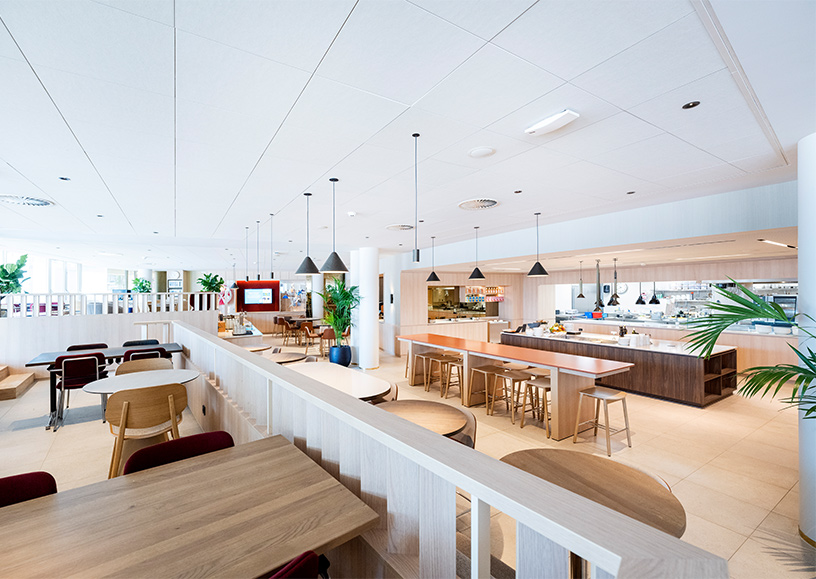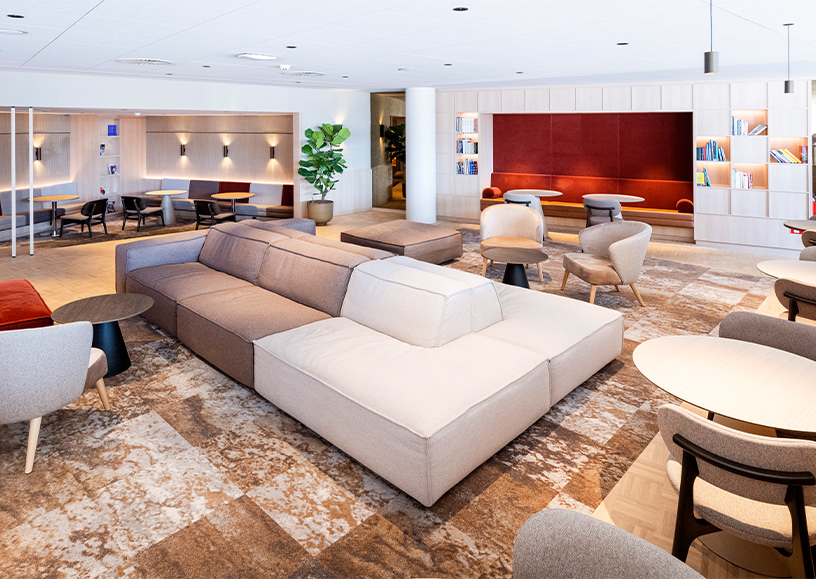
Vegetarian finger foods and smoothies from leftover fruit
The recent renovation of the artists foyer presented the perfect opportunity for Dutch National Opera & Ballet (DNO&B) to set about lowering the carbon footprint of its catering services. With this goal in mind, new menu options were introduced in the public foyer as well. Bas Schotsman, Head of Catering & Front of House, tells us more.
The carbon footprint calculation DNO&B commissioned to be performed in 2022 showed that catering services account for about 16% of its carbon footprint. These are indirect emissions; DNO&B does not grow its own tomatoes on the roof. That said, the production of the food and drinks that are sold in both the artists and public foyers is fairly energy-intensive. The same goes for their packaging and their transport.
‘We use leftover fruit to make smoothies’
The renovation of the artists foyer offered the ideal chance to lower the carbon footprint of the catering supply chain. To achieve this, DNO&B adopted different purchasing procedures and changed the menu options. Products are now sourced locally where possible, there is a lot less meat on offer and vegetables take centre-stage. Quite literally in fact: the new artists foyer features a salad bar in the middle of the room. ‘Just the way you lay out a space can help to encourage people to make more sustainable choices,’ says Bas Schotsman, Head of Catering & Front of House.
Sustainable relationships
Management wanted the artists foyer to be turned into a welcoming space for staff (this foyer doubles as the staff canteen) where colleagues can work together and meet up outside of lunch and dinner hours as well. Schotsman: ‘Sustainability is also about developing sustainable relationships with each other. We found out during the pandemic how important it is to keep an eye out for each other and to seek connection.’
The Works Council was keen to provide input too. Its members wanted the menu options in the new artists foyer to be sustainable, affordable, flavourful and healthy. Schotsman: ‘Because of the health aspect, we now serve a lot fewer deep-fried foods. Not everyone’s a fan; French fries are sorely missed. That’s why we do offer them from time to time. We don’t want to lay down the law. It’s a question of balance.’

The coffee that is served in the artists foyer is a good example of quality and sustainability going hand in hand, says Schotsman. ‘That coffee is organic and fairtrade, and it tastes like coffee from a specialty coffee shop. It doesn’t come cheap, but our people really appreciate it. And that helps to increase our employee satisfaction rating, which brings us back to sustainable relationships.
Preventing waste
To prevent food products from going to waste, the kitchen operates on a strict schedule. Schotsman: ‘We make sure that we know roughly how many people are in the building. If there are opera rehearsals going on, about a hundred chorus members may swarm into the artists foyer at any one time. Our purchasing decisions are geared to this. Also, we try to use seasonal products where we can. Besides being more sustainable, it’s cheaper too.’
‘We’ve stopped selling soft drinks in plastic bottles. They’ve been replaced with organic syrups’
Many of the products on offer are home-made. ‘We make our own sauces and soups from fresh ingredients. To preserve them, they’re vacuum-sealed in manageable ten-litre bags. That means we don’t have to throw away as much if a product doesn’t sell out on a particular day.’
Leftover fruit is used to make smoothies. Schotsman: ‘These smoothies are offered at the cost price of the fruit.’
Reducing plastic waste
Another major change was that DNO&B has stopped selling soft drinks in plastic bottles. Schotsman: ‘We now offer organic syrups for people to mix with sparkling or still water, whatever they prefer. We provide the taps.’
To cut back on plastic, DNO&B now serves all foods on ceramic tableware. Plastic packaging is avoided as much as possible, although that is not always an option. ‘We tried selling unwrapped cheese slices, but that didn’t work. Everyone was poking at the cheese with their fork just to pick up a slice. We can’t have that. Food hygiene isn’t something we want to compromise on. So we went back to plastic packaging. And besides offering trays of yoghurt with fresh fruit, we’ve brought back a certain brand of fruit yoghurt in a plastic cup. Some people proved to be very particular about their yoghurt fix.’

Most of us are creatures of habit anyway, says Schotsman. ‘While appreciating the salad bar, some still prefer the typical Dutch lunch of a cheese sandwich.’ And that’s perfectly fine too, of course
Public foyer
It was not just the menu options in the artists foyer that changed; the food and drink selection in the public foyer was revamped as well. All finger foods that are served at opening nights and events are now vegetarian. Schotsman: ‘We try to source organic products where possible; that includes beer, coffee, tea and fruit juices. Some products, such as our house wines and our sparkling wine, we import straight from the producer. And we preferably use local suppliers. The chocolates and cakes we sell are from shops right around the corner from here. That doesn’t just reduce our carbon footprint, but it also helps the quality of life in the local area. The fewer lorries, the better.’
Text: Anne Havelaar



